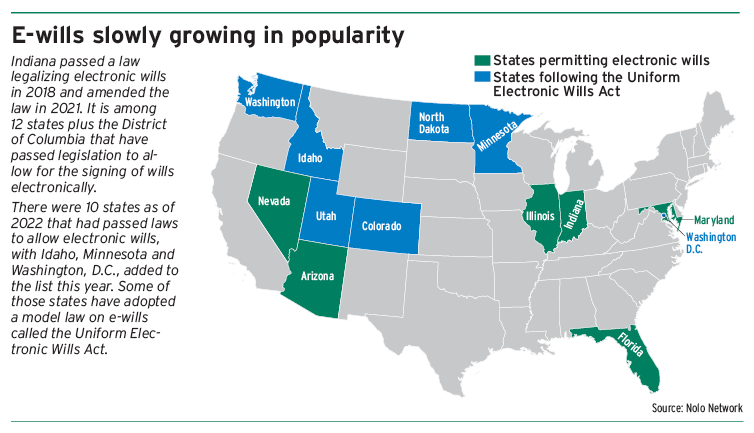Subscriber Benefit
As a subscriber you can listen to articles at work, in the car, or while you work out. Subscribe NowIn a day and age when technological advances bring just about everything to a person’s finger tips, it’s not surprising that some people would want to be able to create a will electronically.
Indiana is one of 12 states, as well as the District of Columbia, that has legalized electronic wills, which are documents created and stored in an electronic record and containing the electronic signatures of the testator and witnesses.
After passing House Enrolled Act 1303 in 2018, which gave clients the option of creating an electronic will, the state passed House Enrolled Act 1255 in 2021 to allow for remote witnessing of e-wills.

Even with the new laws, it’s hard to say how popular electronic wills are in the state five years after they were initially legalized, said Jeff Dible, counsel in Frost Brown Todd’s Indianapolis office.
“We won’t know how many there are until people start dying,” Dible said.
In 2017 and early 2018, Dible was the chairperson of an Indiana State Bar Association task force that drafted the electronic wills, trusts and powers of attorney legislation, which was enacted in 2018 as HEA 1303. He also chaired the subcommittee that drafted the legislation that became HEA 1255 to update and liberalize signing and witnessing requirements for wills. The ISBA sent a survey to approximately 1,200 attorneys in its probate section asking how many were doing e-wills. Only 53 attorneys responded, Dible said, and only a small portion of those respondents said they were doing them.
“It is being done. I know colleagues that are doing it,” he said.
E-wills in Indiana
Back in 2017, legal tech company LegalZoom surprised many in Indiana by lobbying for an e-wills bill, Dible said.
The ISBA’s Probate, Trust & Real Property Section met with the bill’s sponsor and asked for an additional year to create better legislation. The bar association created a task force, which met several times and drafted what would become HEA 1303.
Indiana law had long required the testator and two attesting witnesses to sign the will in each other’s direct physical presence, Dible explained. The concept of remote witnessing was introduced in the 2018 legislation, but opposition led to that portion being dropped.
But with the onset of the COVID-19 pandemic in 2020, the Indiana Supreme Court issued an emergency order allowing for remote witnessing of wills.
After that order was issued, a new, smaller ISBA task force met in April 2020 to begin working on amendments to the original electronic wills legislation.
That became HEA 1255, which, according to Dible, enacted a more “permanent” solution by adding new signing methods for wills with no sunset date and no dependence on any current or future public health emergency.
The new signing methods are optional; if a competent testator can sign a paper or electronic will in the direct physical presence of two witnesses, the law and the procedures remain unchanged.
Dible said the changes to state law in 2021 were done to make e-wills simple and consumer-friendly. He also said the ISBA wanted to make the remote witnessing reforms permanent, in part because there may be a pandemic again sooner or later.
Differing demand

Rebecca Geyer, a Carmel probate attorney with Rebecca W. Geyer & Associates P.C. and the Indianapolis Bar Association’s current president, said she’s one of what is likely a small number of attorneys in the area who do electronic wills frequently.
“I use them fairly routinely in my office, based on my clients’ preferences,” Geyer said. Her office has clients spread across the state, with her practice primarily centered around estate planning.
Geyer acknowledged most attorneys are still requesting that their clients come into the office to sign any wills or estate planning documents.
But in her practice, “Even my clients in central Indiana find it more convenient to sign electronically.”
Part of the reason Geyer said she thinks electronic wills aren’t as popular in Indiana is that some attorneys and clients just aren’t comfortable with the technology involved.
From a legal standpoint, she said she finds e-wills to be safer in some ways because they have timestamps.
In 2018, when Indiana first passed legislation for e-wills, nobody was using electronic wills because it required witnesses to be in the same room as the testator, Geyer said.
“COVID, I feel, very much changed that,” she said. “We were left with situations where we couldn’t be face-to-face.”
Geyer said she’s only prepared one electronically-signed will at her office where the person died. She said there was no issue with the will, and it wasn’t contested in court.
Generational differences?

Jeff Kolb, a 72-year-old Vincennes estate planning attorney with Kolb Roellgen & Traylor, was a member of the state bar association’s electronic documents task force.
Kolb said electronic wills fall into the “new technology” category for him and a lot of his clients.
“People beyond a certain age are used to walking into my office or a lawyer’s office and getting face-to-face advice,” he said.
Kolb said he thinks there’s partially a generational issue behind why electronic wills, and newer technology, in general, are popular with some people but not with others.
“For example, I don’t bank electronically,” he said. “But my partners do. They’re younger.”
But Kolb also said he thinks electronic wills will become more popular as time goes on.
He said a lot of people who create electronic wills online are likely doing it because they’re being cost-conscious.
Kolb said he finds he charges less than some online services for wills. But he acknowledged that he works and lives in Vincennes — not somewhere like Indianapolis, where an estate planning attorney may charge a higher rate.
For his part, Dible said since 2021, he has only had two couples execute e-wills, had remote witnesses and signed electronically.•
Please enable JavaScript to view this content.

